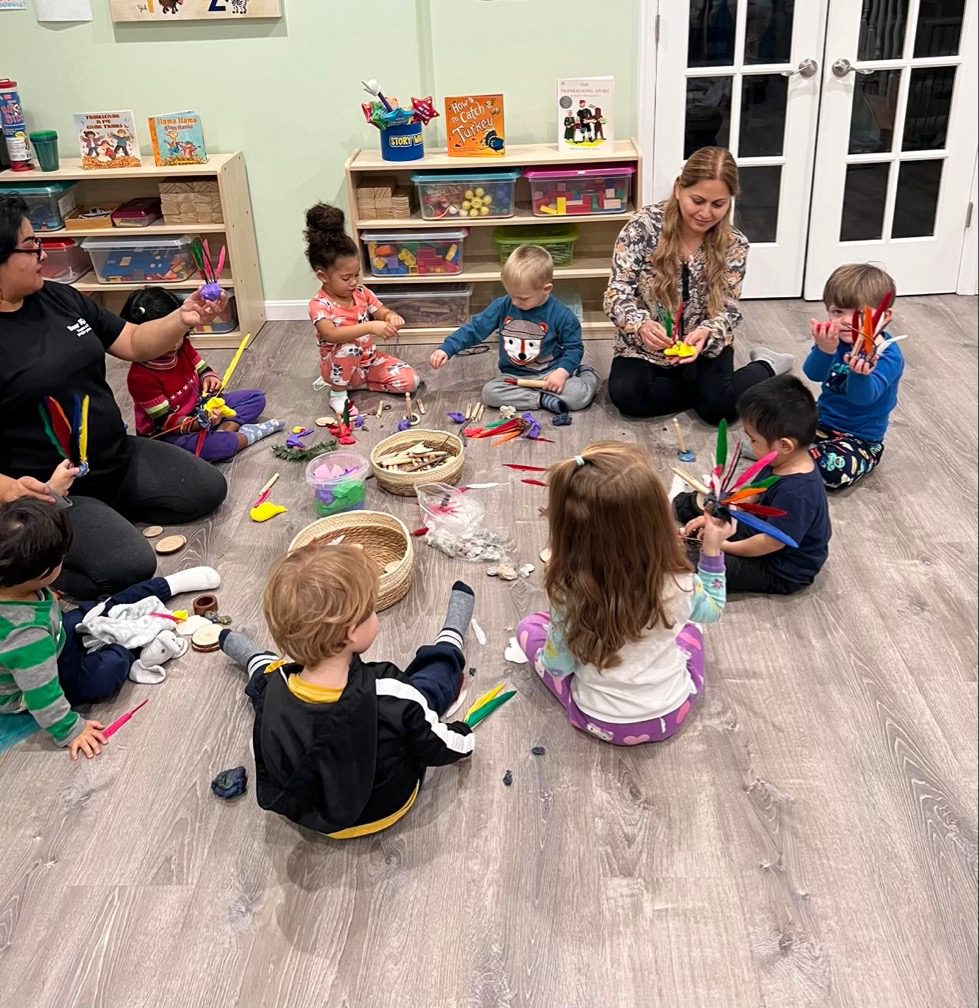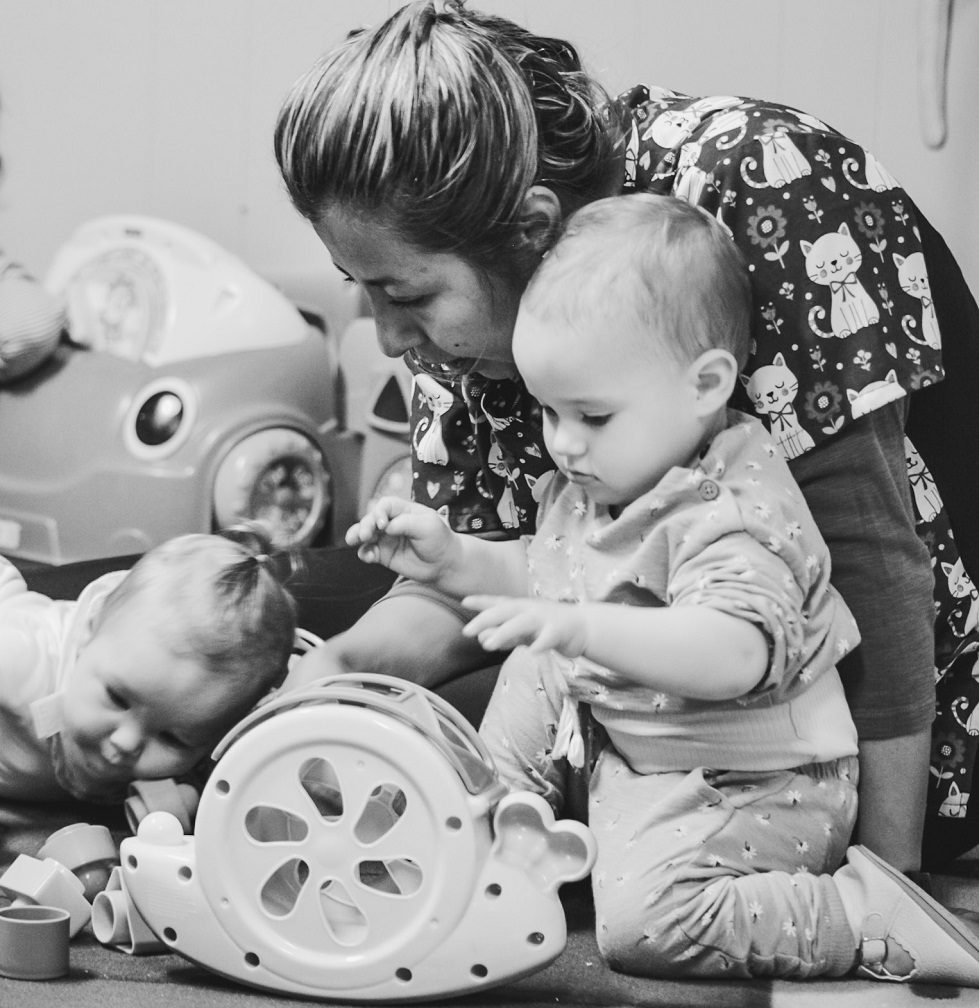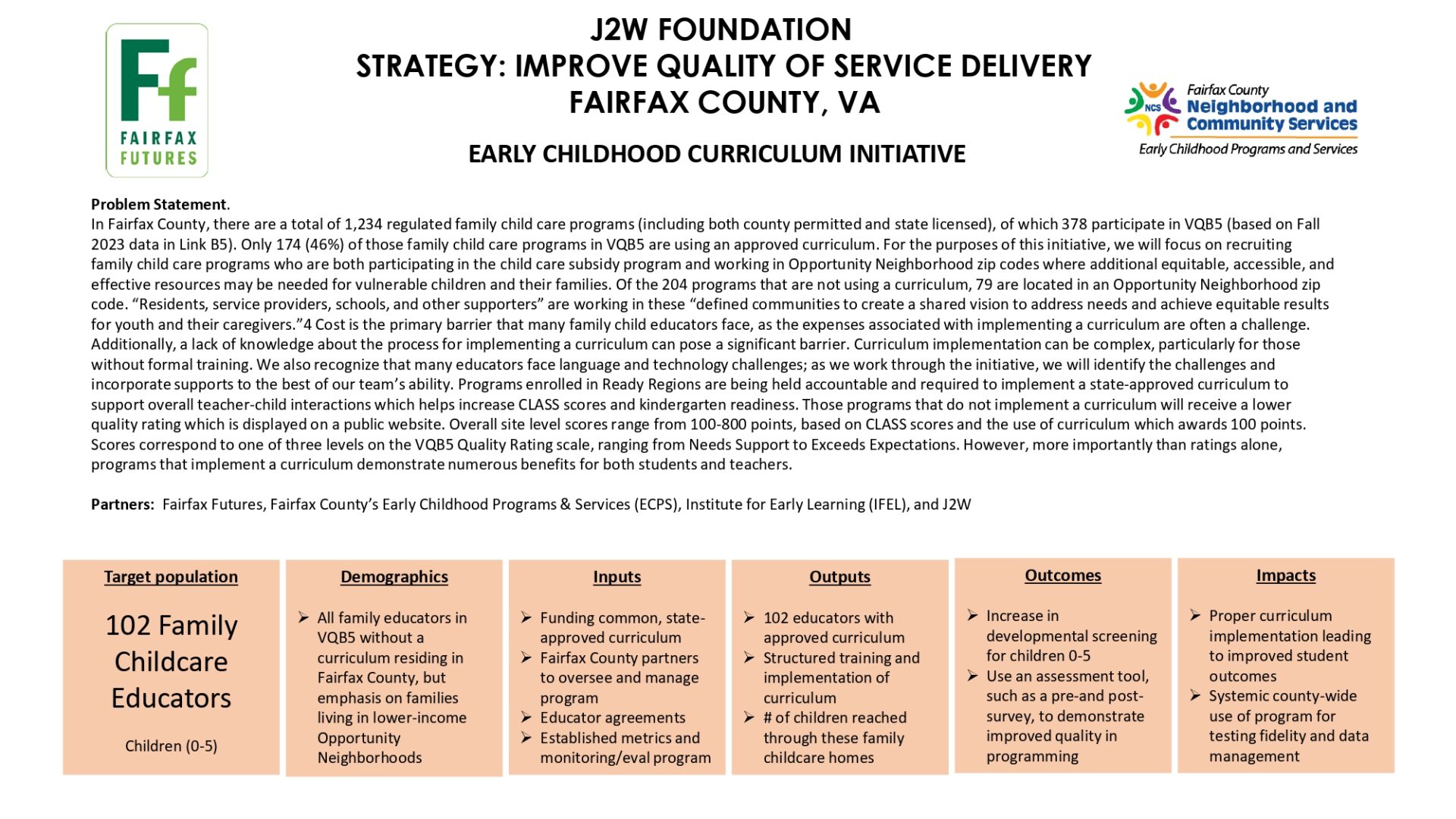Program Summary
- Goal: To strengthen and support early childhood programs across Fairfax County through the implementation of a research-based early childhood curriculum that effectively equips educators with rich content and resources. The curriculum implementation supports developmentally appropriate activities for young children. The Early Childhood Curriculum Initiative is being implemented by the Fairfax County-based Fairfax Futures non-profit organization, in partnership with Fairfax County’s Institute for Early Learning (IFEL).
- Background: In 2021, the state of Virginia launched Ready Regions, a “regional network capable of supporting increased access to quality early childhood opportunities across the Commonwealth.” VQB5 (Virginia Quality Birth to Five) is the unified measurement and improvement system administered by Virginia Department of Education and coordinated locally by Ready Regions with support from Virginia Early Childhood Foundation. VDOE believes that quality teaching and learning is supported by promoting curriculum use in all settings. Using approved and effective curricula helps teachers support learning and development of critical learning skills in all early childhood programs and settings. This initiative will be supportive of the county and state-wide work to advance the quality of early childhood programs that are participating in Ready Regions. Family childcare educators will be the primary audience that we support as we pilot-test the program.
- Theory of Change: A high-quality curriculum defines specific, sequenced learning goals to meet all children’s individual needs, including children with disabilities, suspected delays, or other special needs, and provides developmentally appropriate structure and sequence to classroom activities that promote children’s engagement. We believe if we deliver a quality curriculum to programs within Opportunity Neighborhoods that do not have the capacity to implement with current resources, we can help teachers improve their interactions, providing ways to create nurturing and responsive practices and environments that foster trust and emotional security and thus ultimately improve children’s outcomes and preparation for kindergarten.
- Framework: We will employ The Creative Curriculum® for Infants, Toddlers & Twos, a comprehensive, research-based early childhood curriculum created by Teaching Strategies, LLC. The Creative Curriculum equips early childhood educators with the tools to support early learners with building self-confidence, creativity, and enhancing critical thinking skills through hands-on, project-based investigations. The Creative Curriculum aligns with the Virginia Early Learning Standards and promotes the following benefits: Builds on Early Learner’s Social-Emotional Development | Improves Kindergarten Readiness | Nurtures the Whole Child | Builds early language and literacy skills | Individualizes instruction | Develops math skills | Includes technology tools to streamline teaching


Measures of Performance
For more information, please see Data Analysis section at the bottom of the page.
Data Analysis
- Goal: To strengthen and support early childhood programs across Fairfax County through the implementation of a research-based early childhood curriculum that effectively equips educators with rich content and resources. The curriculum implementation supports developmentally appropriate activities for young children. The Early Childhood Curriculum Initiative is being implemented by the Fairfax County-based Fairfax Futures non-profit organization, in partnership with Fairfax County’s Institute for Early Learning (IFEL).
- Background: In 2021, the state of Virginia launched Ready Regions, a “regional network capable of supporting increased access to quality early childhood opportunities across the Commonwealth.” VQB5 (Virginia Quality Birth to Five) is the unified measurement and improvement system administered by Virginia Department of Education and coordinated locally by Ready Regions with support from Virginia Early Childhood Foundation. VDOE believes that quality teaching and learning is supported by promoting curriculum use in all settings. Using approved and effective curricula helps teachers support learning and development of critical learning skills in all early childhood programs and settings. This initiative will be supportive of the county and state-wide work to advance the quality of early childhood programs that are participating in Ready Regions. Family childcare educators will be the primary audience that we support as we pilot-test the program.
- Theory of Change: A high-quality curriculum defines specific, sequenced learning goals to meet all children’s individual needs, including children with disabilities, suspected delays, or other special needs, and provides developmentally appropriate structure and sequence to classroom activities that promote children’s engagement. We believe if we deliver a quality curriculum to programs within Opportunity Neighborhoods that do not have the capacity to implement with current resources, we can help teachers improve their interactions, providing ways to create nurturing and responsive practices and environments that foster trust and emotional security and thus ultimately improve children’s outcomes and preparation for kindergarten.
- Framework: We will employ The Creative Curriculum® for Infants, Toddlers & Twos, a comprehensive, research-based early childhood curriculum created by Teaching Strategies, LLC. The Creative Curriculum equips early childhood educators with the tools to support early learners with building self-confidence, creativity, and enhancing critical thinking skills through hands-on, project-based investigations. The Creative Curriculum aligns with the Virginia Early Learning Standards and promotes the following benefits: Builds on Early Learner’s Social-Emotional Development | Improves Kindergarten Readiness | Nurtures the Whole Child | Builds early language and literacy skills | Individualizes instruction | Develops math skills | Includes technology tools to streamline teaching.
- Measures of Performance: We will begin this project with a focus on process and output measurements, which will include a phased approach to training and implementation, growing the number of participating programs.
- Initial outcome measures may include:
- Number of family childcare educators from Opportunity Neighborhood zip codes.
- Number/percentage of family childcare educators who complete the course requirements and implement a curriculum.
- Number of children reached in family child care programs of educators who complete the course requirements and implement a curriculum.
- Use an assessment tool, such as a pre-and post-survey, to demonstrate how implementation of The Creative Curriculum improves quality by increasing the competencies and skillsets of early childhood educators in the classroom.

